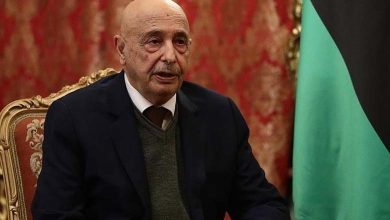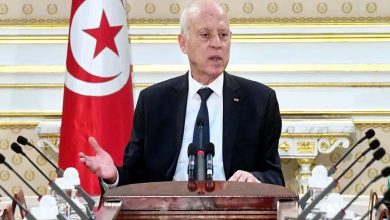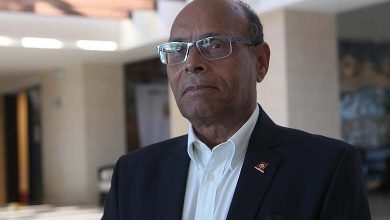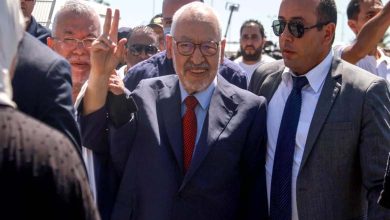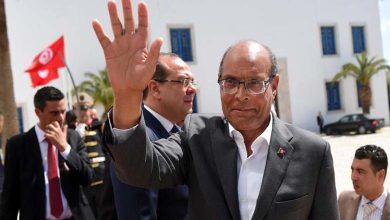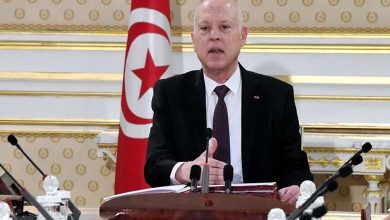Aguila Saleh in the Eid speech.. The achievements of the Libyan parliament and the failures of Dbeibeh
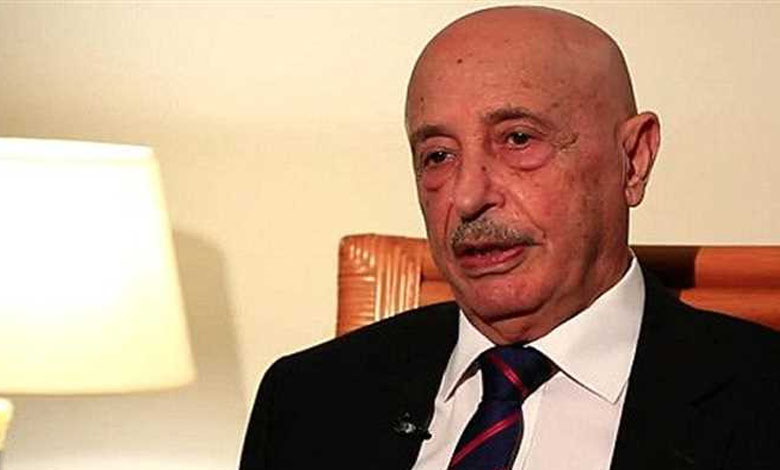
Efforts by the Libyan parliament to resolve the deepening crisis have been matched by failures by the previous government, which have exacerbated the uncertainty of the situation.
Addressing the Libyan people on the occasion of Eid Al-Adha, Aguila Saleh Issa, the speaker of the Libyan parliament, said, “The House of Representatives has worked diligently and diligently to achieve the process of change and the peaceful rotation of power, which is one of the most important democratic rights of the people, in a way that will end the crisis and suffering, and to create the appropriate atmosphere for holding the next presidential and parliamentary elections as soon as possible.”
He added that these efforts came through the parliament’s engagement and positive engagement with the challenges facing the political and democratic process.
Saleh reminded Libyans of the measures taken by the council in this regard, including “ending the state of administrative division as the biggest challenge facing the elections by unifying institutions”.
He pointed out that the foregoing was “the main reason for the Council’s decision, pursuant to its oversight authority over the government, to withdraw confidence from the outgoing government of national unity (headed by Abdul Hamid Dbeibeh), which failed to do so, and to assign a new government headed by Fathi Bashagha based on a Libyan-Libyan consensus and through procedures based on the validity of the Constitutional Declaration, the law and the provisions of the political agreement that was completed under the direction of the United Nations Mission in Libya.”
About two years ago, the parties to the Libyan conflict in Geneva and Tunisia held consensus discussions on holding elections in an unscheduled date on December 24, after the Dbeibeh government objected to the election law issued by the House of Representatives.
Determination to divide
In his speech, Saleh expressed his regret over “the insistence of the Dbeibeh government to move towards the continuation of the division process and obstructing the elections, with a noticeable vacillation in the position of some members of the international community. This was exploited by the outgoing government to challenge the will of the people by imposing a fait accompli, taking advantage of the presence of state institutions and the central bank in Tripoli.”
“The House of Representatives, pursuant to its legislative authority, has issued all the necessary legislation to conduct the presidential and parliamentary elections and the referendum law,” he said.
According to Saleh, the House of Representatives is keen to “consolidate important principles, foremost among them the principle of non-exclusion from the electoral process by opening the door for candidacy to all, paving the way for acceptance of the election results”
Saleh went on to review the actions of the Council of Representatives to resolve the Libyan crisis, saying that the Parliament had engaged in a serious and positive manner in the constitutional process held in Cairo. He said that the most important constants that the Council had been keen on to ensure the safe passage and smooth transfer of power by accepting the results of the elections, which is the principle of not exclusion from the electoral process by allowing all actors to run in a manner that suits the exceptional circumstances and addresses the causes of the conflict.
He pointed out that, “The conditions of candidacy, especially in the presidential elections, were among the most controversial and pending points”, stressing “the Council’s insistence on the need to move away from the exclusionary approach as one of the biggest factors in the failure of the political process and the inadmissibility of its results, and this is the same constant that the Council presidency insisted on in the Geneva discussions after the Cairo meetings.”
Failure
“The role of the Council of Representatives is limited to monitoring and holding the government accountable, which the Council did by withdrawing confidence from the government of Dbeibeh, as a result of its failure to achieve the required services, foremost among them the issues of electricity, health and other services, despite the disbursement of billions of dinars without improving these services, which are getting worse day by day,” he said.
“The outgoing government is still insisting on aggravating the situation, taking advantage of the presence of the Central Bank in Tripoli and the ambivalence of some parties in the international community,” he warned.
He also warned of “the danger of what some internal parties, supported by some external parties, are trying to inflame public opinion against the Council of Representatives by blaming it for the political impasse and the deterioration of services to create a new fait accompli that will only lead the country to continuous division and increased suffering.”
“The House of Representatives will continue its good faith, non-exclusion and the higher interest of the Libyan people as the basis for its involvement in political dialogs,” Saleh concluded. “This will provide a solid foundation for the political process and ensure its success and acceptance of its results, taking into consideration that this will be done at a specific time as soon as possible, in a way that achieves the aspirations of the people in the process of change and democratic transition.”
Recently, the Libyan crisis escalated after Abdul Hamid Dbeibeh rejected the parliament’s decision to dismiss him while he was still clinging to power and refusing to hand over power to the Bashagha government, which was appointed by the House of Representatives in early March.




